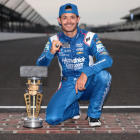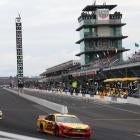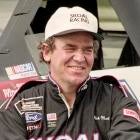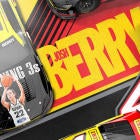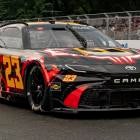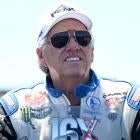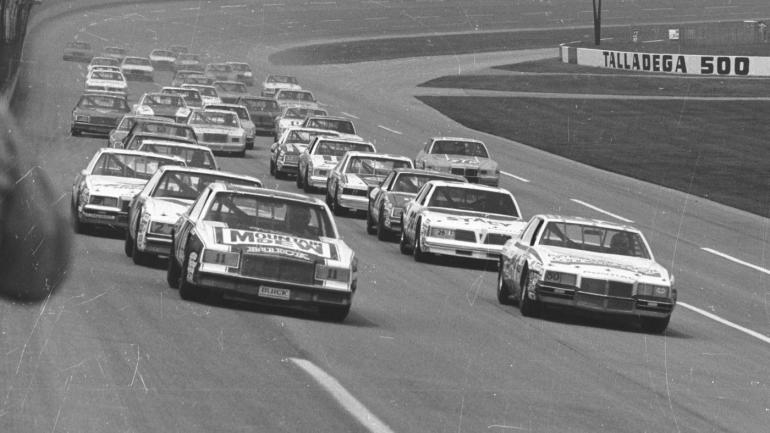
For as long as there have been organized stock car races, there has been a long rap sheet of hucksters, swindlers and con artists who have associated themselves with racing: some with get-rich-quick schemes, others with ambitions too good to be true, and almost all of them leaving a trail of bounced checks and broken promises in their wake.
And then, there's L.W. Wright.
For 40 years, Wright has stood as one of the most mysterious and dubious characters in the history of NASCAR. Wright entered the 1982 Talladega 500 with a team based out of Nashville before dropping out of the race, skipping town and disappearing. Now, 40 years after the fact, Wright re-emerged in an interview with longtime NASCAR journalist Rick Houston of The Scene Vault Podcast, attempting to set the record straight on who he was and what he was trying to accomplish in arguably the most bizarre one-off NASCAR has ever seen.
Forty years ago today, L.W. Wright became a legend. One of the most anticipated post-race interviews ever is available now ... only on The Scene Vault Podcast.
— The Scene Vault Podcast (@TheSceneVault) May 2, 2022
iTunes: https://t.co/MFbcE2KWi9
Spotify: https://t.co/HbMF2SSoaI
YouTube (Clip One): https://t.co/Z9QT2VOQZK pic.twitter.com/1TECSeBUQ0
As recounted by Ryan McGee of ESPN, Wright entered the Talladega 500, claiming that he was a 33-year-old driver with 43 starts in the Busch Grand National (now Xfinity) Series and had sponsorship from country music artists Waylon Jennings, Merle Haggard and T.G. Sheppard. Although Wright was able to buy a car from Sterling Marlin and his father, as well as procure a NASCAR license, his story gradually began to not add up.
While Wright claimed to have won extensively on short tracks in Virginia, he didn't know the names of any of the notable Virginia short trackers of the time and peppered Marlin with many basic questions that any racer should have known. Meanwhile, Sheppard released a statement saying that he had never heard of Wright. Wright himself then backtracked on claims about his racing experience.
He was able to qualify 36th for the race and repair his car despite crashing it on his second lap of qualifying, but did not maintain minimum speed and was parked by NASCAR after 13 laps. Wright vanished shortly after failing to qualify for the next race at Nashville Fairgrounds, and all checks he had written were returned due to insufficient funds. His whereabouts remained a mystery until the recent interview with Houston, which was released 40 years to the date of his only Cup start.
Wright revealed in the interview that his identity is Larry Wright, and he verified his identity by offering his racing suit from Talladega -- which matched what pictures could be found from 1982 -- as proof. Now 73, Wright stated that he is in poor health and wished to offer his side of the story while he could.
Wright says that he bought a car from Coo Coo Marlin under the condition that Marlin's crew pitted the car at its first race and painted it black with No. 34 the side, alleging he chose the number as a nod to longtime independent driver Wendell Scott as well as his own age at the time. He claimed he had been involved in the country music business as a bus driver, and was offered financial assistance to race Talladega by Merle Haggard and others.
He also recalled that he had never been to Talladega before entering the race, and how he was overwhelmed by the size and scale of the racetrack he was going to compete on.
"I remember pulling into the infield that day and standing at the end of the track and looking down it. And I looked over at my brother and I said 'Lord have mercy, there ain't no way!'", Wright said. "...'You think about holding that car, the pedal flat on the floor all the way around this track, that straightaway's almost a mile long. How much can that car gain before you go into that turn?' And that was my first thought.
"I got off by myself that day, and I said 'Lord, I'm down here but I'm gonna need some help.' And I didn't tell nobody else that."
Wright disputed parts of the legend surrounding himself, specifically as it pertained to the money he owed to NASCAR, Marlin and others like team owner and investor B.W. Terrell. Wright says he paid for his NASCAR license in cash, and that he had agreed to pay Marlin after the race was over. Wright classified the nature of his financial issues as being characterized by unpaid bills from sponsors that backed out rather than bounced checks, and also said that legends about the amount of money he owed were a myth.
"The people that was puttin' money in the car to catch up, these promised notes or bills, didn't. When we didn't get to run the race, they just quit. So it was left on me by myself," Wright said. "... If you could find somebody that said that I owed them $30,000, you tell them and I'll face 'em. I want to see who they are, and I want to know how it come about. If that makes them stutter, you know what I'm talkin' about, okay?"
The $30,000 was the most notable figure Wright was alleged to owe, as he had received the money in a loan from Terrell. Wright has since outlived a number of people involved in the deal.Terrell died in 1998, while Coo Coo Marlin died in 2005. In a 2019 interview with ESPN, Sterling Marlin stated he hadn't been surprised when Wright did not meet his financial obligations.
The incident remains one of the more bizarre stories in the long and colorful history of NASCAR. As for the 1982 Talladega 500 itself, the race was won by Darrell Waltrip.











